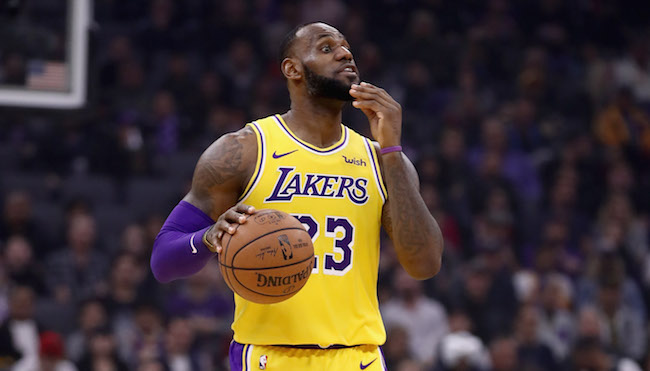
When Rajon Rondo went down with a broken hand, ball-handling duties for the Lakers shifted. Lonzo Ball is still the nominal point guard with the starting lineup, but it has also gotten LeBron James more involved as a ball-handler and, unsurprisingly, that’s been a boost for both his stats and the Lakers’ success as a team.
LeBron gave his annual spiel about playing more off the ball and going to the post and not being the primary ball-handler this offseason, but as happens every year, he finds he’s most comfortable and the team is best off when he is the one initiating plays and making decisions. This has been the case for LeBron’s entire basketball playing career, and for some reason each year folks (including LeBron) insist he’s going to be willing to take a back seat.
ESPN’s Brian Windhorst took a look at James’ return to being on the ball more, highlighting a few things that have stood out from Second Spectrum tracking data and in discussions with advanced scouts that have been watching the Lakers recently. For one, he’s handling the ball for a full minute more per game than he was prior to the Rondo injury, per Second Spectrum, which, as Windhorst notes, might not sound like much but with the pace the Lakers play at that’s a lot more possessions he’s initiating each game — and as such he’s scoring five more points per game.
However, the most interesting nugget from Windhorst’s look at point forward LeBron is that advanced scouts have noted that Luke Walton has had to learn to take a hands off approach to play calling when LeBron’s handling the ball by letting James run the show — partially because LeBron wasn’t paying any attention to Walton’s play calls anyway.
The scouts also have noticed that when James is running the point, he rarely looks toward the bench to receive playcalls from coach Luke Walton. Even when he has seen them, the scouts say, he ignores them and runs the play he prefers. Walton has adjusted, and now when James is running the show, Walton will typically just let him call the game. This probably shouldn’t be considered a slight — it’s just James being James.
As noted by Windhorst, this isn’t necessarily LeBron trying to overrule Walton in a negative sense, but is instead one of the greatest players of all time believing he knows what’s best for the team — since for years, well, he has. This is part of the learning curve for Walton in coaching LeBron. We don’t know exactly how James feels about Walton as a coach or whether he thinks he’s the man to lead the Lakers long-term, but LeBron shaking off signs to go with his own ideas isn’t something unique to Walton and isn’t necessarily a sign that Walton is doomed as Lakers coach.
Every coach in James’ career has had to figure out how to harness LeBron’s basketball IQ and take advantage of the way he sees the floor and the game. Part of doing that is taking a step back and, when he’s playing point forward, letting him do his thing because typically it works pretty well. What becomes interesting is what happens when Rondo returns to the floor and whether LeBron is willing to relinquish that point forward role again — especially if the results go back to what they were.
Part of the Lakers’ recent surge is schedule related, but there’s no denying they’re playing better ball right now and at least part of that has to do with LeBron being more involved as the initiator of their offense. You can bet that James notices this change as well, and my guess is, he’ll look to continue being a bigger on-ball presence for the remainder of this season, no matter who is healthy and on the court with him.






